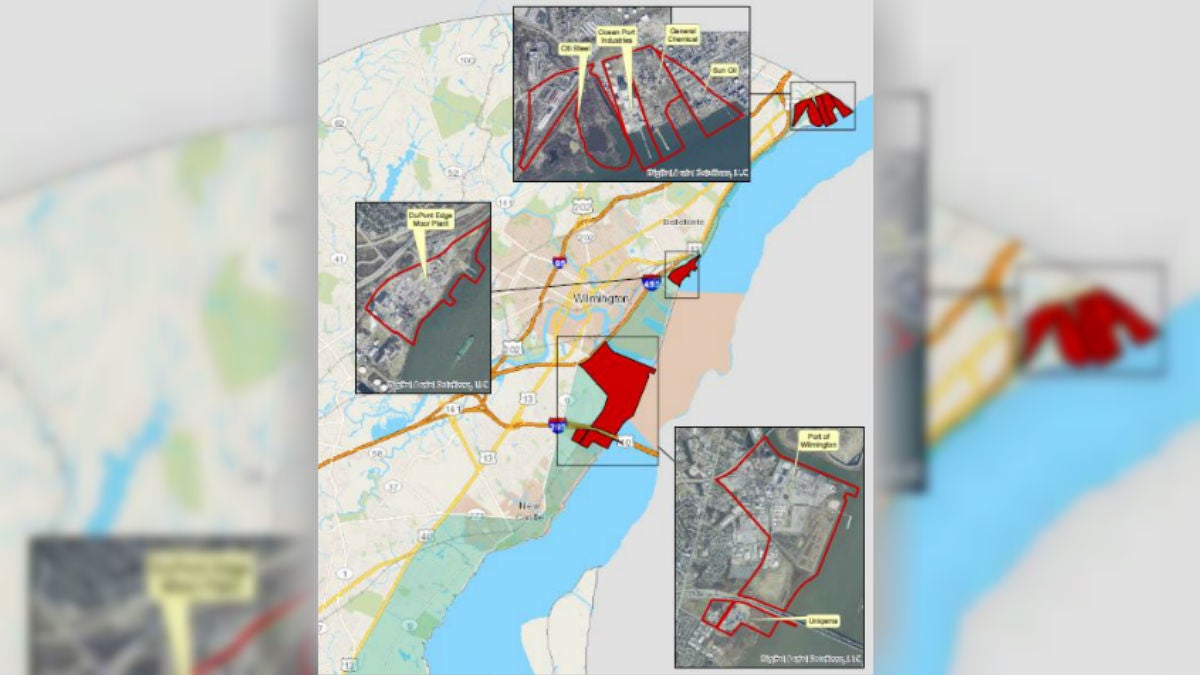Strong pushback to proposed Coastal Zone Act changes [video]

A map shows areas along the Delaware River in northern New Castle County where industrial sites are grandfathered in under the Coastal Zone Act. (DNREC photo)
Legislation designed to update parts of the Coastal Zone Act is on its way to the House, after easily making it out of committee.
House Bill 190 would change some language in the landmark environmental legislation to allow for new heavy industry. Under the bill, prospective companies would have to apply for what’s called a “conversion permit,” to repurpose a limited number of brownfields along the Delaware River.
Passed in 1971, the Coastal Zone Act (CZA) protects Delaware’s natural coastal environment by controlling what type of heavy industry can set up shop along the Delaware River and where they can set up. Fourteen sites where heavy industry already existed before the legislation was passed, like the DuPont Edge Moor site near Wilmington, were allowed to continue. However, many of those 14 grandfathered sites now sit shuttered or underused. The brownfields are some of Delaware’s most contaminated.
Newark Rep. Ed Osienski said the way the Coastal Zone Act is currently written hurts businesses and infringes on potential job opportunities because it only allows the exact same heavy industry to operate on those sites. HB 190, if passed, would relax the language to allow new heavy industry to repurpose the grandfathered sites for an alternative use.
“There was really no flexibility there. I think everybody in the business community realizes that a business that cannot adapt and be flexible — I mean, products change, industry activity changes, there’s always new technology — so you gotta have that flexibility,” said Osienski, D-Newark, HB 190’s prime sponsor.
State Senator Bryan Townsend is the chief sponsor on the Senate side. He said the legislation strengthens the framework of the Coastal Zone Act, because it would require the new owner to clean up the brownfield, provide a sea level rise plan and prove it has the money for cleanup, should an accident occur, among other things.
“This is a reality of part of what we need to do, is take a look at whether or not outright prohibition of heavy industry on brownfields is really the best way to go about trying to foster a more dynamic economy,” Townsend, D-Newark/Bear said.
But Delaware Audubon Society President Matt DelPizzo said the CZA isn’t keeping businesses away from Delaware, rather, the economic decline of heavy industry overall is to blame.
“If companies weren’t coming because of [the CZA], then they would be looking at neighboring states or border parts of the river where they could do this, where they wouldn’t have to clean up a site, wouldn’t have to invest before they got started. So if you look up and down the river, there’s zero industrial activity, there’s no new sites opening,” said DelPizzo, adding HB 190 accomplishes nothing, except to weaken the CZA’s protections.
“There is a chance that you could get a bad actor that would come in and do irreparable harm in the coastal zone,” DelPizzo said.
Additionally, DelPizzo said those grandfathered sites are zoned for light industry, so anybody could come in and repurpose those sites without making any changes to the CZA.
For example, the CZA, as it’s written, allows a car manufacturer to come in and set up shop, if an automaker was interested. The original language allows for the brownfields to be used for manufacturing purposes.
“Some people have said the worst thing that happens is nothing. If the global economic pressures and those other forces at play mean that no heavy industry comes to these limited number of locations, then they’ll continue to be what they are now,” Townsend explained. “It’d be one thing if we were talking about expending millions of dollars to build something that we have no idea if someone’s going to come use, but here what we’re saying is right now our law prohibits new heavy industrial activity at these limited number of sites. And so we’re saying that lifting that outright prohibition, imposing even stronger environmental requirements for people to come in is the right balance to strike. And if nobody does, then we’ll proceed along the current path. But we at least think that flexibility is important in this very quickly changing economy.”
HB 190 would only allow conversion permits for those 14 grandfathered sites. Heavy industry like oil refineries, steel mills and incinerators would continue to be forbidden, as they have been since the CZA was enacted 46 years ago.
Bulk product transfer
HB 190 would also allow the nine sites in the coastal zone that had docks or piers before 1971 to apply for a bulk product transfer permit. In other words, if approved, owners at those sites could move bulk goods by ship along the Delaware River, which is currently forbidden under the CZA.
“The reality is some of the more possible economic opportunities, the more discernible economic opportunities, might involve bulk product transfer,” Townsend said.
“We’re really hoping what we’ve done here with HB 190 will entice and attract some heavy industry. We realize that the bulk product transfer was an important part of that,” Osienski added.
This change is particularly worrisome to environmentalists who have said one spill could reverse any and all gains achieved because of the CZA.
“The bulk transfer is very troubling. Now there’s exclusions to what they can haul up and down the river, but you have to take in already what’s going on there with barge traffic, with petroleum products and all. So the chance for spills can be magnified greatly because you’re talking about 14 sites,” DelPizzo said.
But Osienski said advances in technology and increased regulations on bulk product transfer has made the practice safer over the years.
Added responsibilities for DNREC
Delaware’s Department of Natural Resources and Environmental Control (DNREC) would be in charge of issuing the conversion and bulk product transfer permits. This is another point of contention, said DelPizzo, who alleged the state agency is “failing miserably” to enforce the CZA laws on the books now.
“DNREC cannot handle their workload as it is. This would extend them to be doing other things. They’re in freefall right now.”
In a June 6, 2017 letter to lawmakers, opponents cited EPA numbers reflecting a substantial Coastal Zone permit backlog.
“We have little confidence that DNREC has the capacity to accept the new permitting responsibilities required by HB 190,” the letter stated.
DNREC spokesman Michael Globetti emailed a statement in response to these remarks.
“Consistent with the position of the Governor, the Delaware Department of Natural Resources and Environmental Control (DNREC) supports this legislation to amend the Coastal Zone Act because it will help create economic opportunities and good paying jobs, while continuing to realize the original intent of the Act in striking a balance between protecting the natural resources and environment of Delaware’s coastal zone and introducing new industry into Delaware.”
He continued:
“DNREC currently has one coastal zone permit application pending … In short, there is no backlog of permits within the Department relative to the Coastal Zone Program, whose permitting has no tie-in with federal regulations or the US EPA.”
History and next steps
The CZA was championed by former Governor Russ Peterson. The oil industry lobbied against it and the federal government opposed it. After hours of tense legislative debate, the measure narrowly passed by one vote in 1971.
Peterson’s widow June wrote a letter to state lawmakers last month. It read, in part, “If alive today, Russ would be adamantly opposed to making changes to the CZA to allow for new heavy industry and bulk product transfer. I have no doubt that he would be in Dover lobbying for the sanctity of the Coastal Zone Act.”
“Russ would always say, ‘You know they’re going to come for this,'” said Matt DelPizzo, president of the Delaware Audubon Society. “I think it’s just an opportune time for them to come for this because one, he’s passed so he can’t come out and defend it himself anymore. Two, we’re in such economic dire straits in the state that they think it’s prime to and the business side has been leaning on this since 1971.”
The bill was voted out of the House Natural Resources Committee last week. It’s not clear when the bill will come up for a vote on the House floor.
WHYY is your source for fact-based, in-depth journalism and information. As a nonprofit organization, we rely on financial support from readers like you. Please give today.


